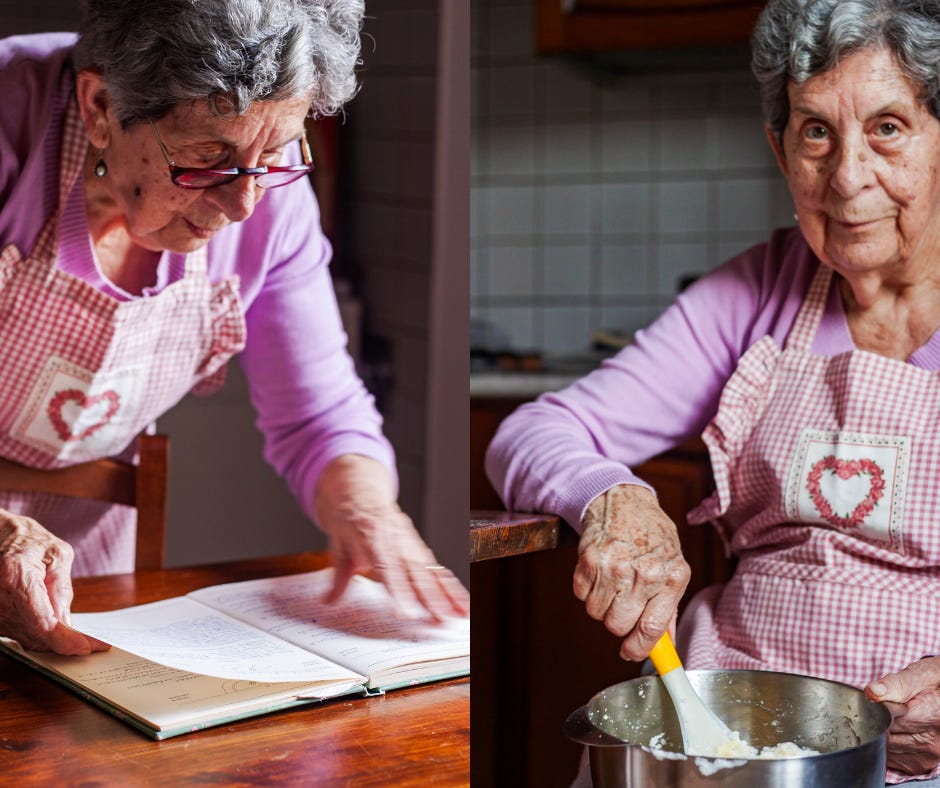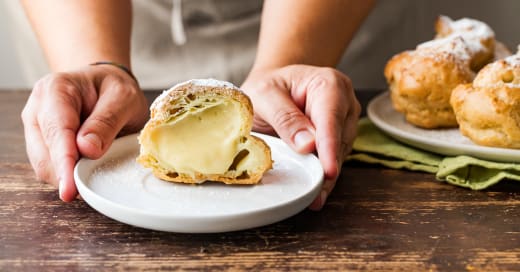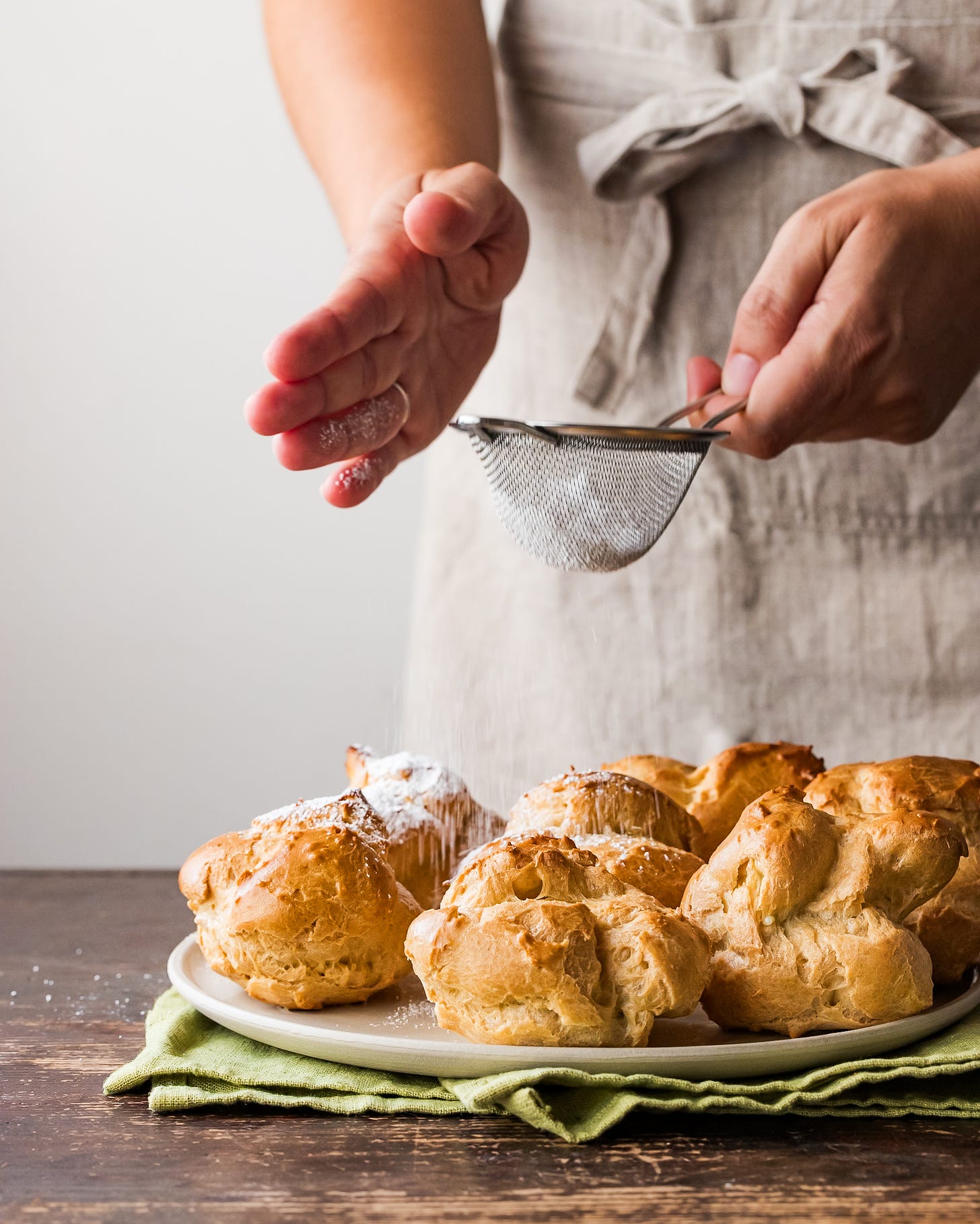My grandma's olive oil choux pastries
Today I am reclaiming my right to write about food through the recipes and memories I have of my grandmother.
There's something magical about a nonna’s cooking. Her food wasn't just a meal—it was love, care, family history, and local traditions on a plate.
I used to believe my nonna’s food was far superior to my mum’s, hands down: her fried cutlets simmered tomato sauce, her stewed green beans, and her olive oil roast chicken were unmatched. It makes sense now, looking back at my childhood, that my mum was still learning to cook. Even today, she enjoys reading and gardening far more than cooking.
Now, Livia prefers my mum’s pasta al pomodoro, her mashed potatoes, and even her riso in bianco—plain white rice with a knob of butter—to mine. It’s not just about the ingredients or the recipe—it's because she’s her nonna, and that alone makes her food the most delicious in the world.
Recently I’ve read so many rants about the role of nonnas in the storytelling of Italian food, and of traditional food in general. Referring to the figure of a grandmother is often considered a cliché. It’s true, the image of a nonna standing over a stove, stirring a pot of simmering sauce, or rolling out the dough for a jam crostata, is iconic to the point of being overused.
But what these critiques miss is the depth behind this image. For many of us, a nonna is not just a figure of the past, a nostalgic character. She’s the living, breathing connection to a way of life and a set of traditions that are at risk of disappearing. I have written a whole book on Cucina Povera, the ancient yet modern way of eating typical of the Italian food culture, based on the principles I have learned over the years from my grandmother in the kitchen.
So what if I actually inherited my love for cooking from my nonna? What if I’m still counting my blessings because I’ve been so lucky to live next door to her for all my life, and we got to celebrate her 96th birthday on Monday?
Today I am reclaiming my right to write about food through the recipes and memories I have of my grandmother.

Every time nonna handed down a recipe, she gave me more than just ingredients and instructions. She shared the story behind it, the right dish to serve it in, the special occasion to celebrate with it, and even fun anecdotes. She showed me how to stir the pastry cream, when to add salt, and why.
She handed down to me her recipes, but also recipes that someone else had passed down to her over the years. Every time she would add bits of information about the great woman behind a dish, a relative, or a neighbour. A recipe is not just a recipe, but a key to accessing a past moment, unraveling stories of weddings, country works, family gatherings, and short trips that back in her young years looked like far-away travels.
Every recipe is a page from her personal book of life, a piece of Tuscany’s rich culinary heritage that she has passed down to me, ensuring these traditions won’t be forgotten.
If I have to find one single reason to keep writing here in this newsletter, or on the blog—besides the great fun I have in sharing recipes with you—well it would be this enormous archive of family recipes I’m building and preserving for the other members of our family. And I do it especially for Livia, so she can one day share these recipes and memories with her own family, keeping our traditions alive.
I’d love to hear your stories about family recipes! Try making these choux pastries, and let me know how they turn out. Do you have a nonna or another family member who inspired your love for cooking?
My grandma’s olive oil choux pastries
The recipe I’m sharing today is very close to my grandma’s olive oil choux pastries. They were a hit at every birthday party or family gathering: giant choux pastries filled to the brim with a thick pastry cream. You needed to sit down and tackle them with both of your hands, carefully leaning forward to provide a safe surface for the pastry cream to fall on: better a saucer than your shirt.
Like many recipes from the Tuscan countryside, these choux pastries are made with olive oil—always extra-virgin—rather than the butter used in the traditional French version. Olive oil gives the choux pastries an unmistakable fruity aroma and makes them suitable also for those who are dairy-free, just like me (I shared the reasons behind my going dairy-free in this archive post).
She lost the original recipes years ago, but in 2013 we spent an afternoon working together in the kitchen to recreate her recipe, and we got pretty close. This year, to celebrate my 43rd birthday in July, I dug up that recipe from the archive and improved it to make the olive oil choux pastries of my dreams.
If my grandma’s choux pastries were already dairy-free, the same can’t be said about the pastry cream, usually made with whole milk, sometimes even cream. Following my friend Emanuela’s recipe, I made a version with oat milk, spiked with vanilla and lemon zest, which is now my go-to recipe for pastry cream.







